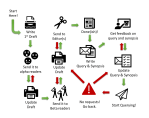In the publishing industry, many badly-written queries are considered especially heinous, and they are probably the reason why you didn’t get published yet.
The dedicated people who reply to query letters are members of an exclusive elite squad known as literary agents.
These are their stories.
A big thanks to agents who take their time to tweet their queries. This series would not be possible without them.
Navigate to posts in this series:
Previous post: Analysis of all agents.
Next post: Agent Y.
Agent X
In my previous blog post, I did an analysis of what genres agents are looking for in the US based on data from querytracker.net. Unfortunately, the main tongue-in-cheek question–why the agent doesn’t love me–wasn’t addressed. The problem is that this differs from agent to agent, so it’s hard to answer it.
Therefore, I decided to analyze a series of queries assessments on twitter for a few agents, starting with agent X. For the purposes of this post, X is a literary agent that posted information about 200 queries on twitter in the last few years.
Agent X is looking for Middle Grade, Young Adult, Romance, Erotica and Science Fiction and Fantasy.
Overview
I analyzed 200 queries from agent X, and she requested partials from 27 letters, or about 13.5% of the queries (a surprisingly high number).
Dislikes top her list – we’ll talk about them later. And here’s a pie chart of said queries:
The chart below shows the genre distribution of the incoming queries

Unfortunately, agent X didn’t mention the genre of most queries. Also, she didn’t always specify if the query was Young Adult, so it’s possible that some F (Fantasy), SF (Science Fiction), R (Romance), etc. are also YA.
The percentages here are in relation to the genre of incoming queries. For instance, Science Fiction has 19 queries but only had 2 requests, totalling less than 10% of the Science Fiction letters. However, we don’t know how many SF queries are in N/A so this number doesn’t have much meaning.
Rejections
86.5% of the queries were rejected for several different reasons. Now you may know the reason why you’re crying.
Agent Dislikes
Most queries were rejected because the agent just didn’t like them. Some of the rejections were because she didn’t like something in the query. So beware of what you write. In most cases they are due to personal preferences of the agents. This is another reason why you should do your research before querying them.
The reasons she rejected the queries are:
- Thrillers.

- Racist lines. Duh!
- Science Fiction that relies only on social themes.
- Thinly veiled memoirs. It’s the story of your life as if you were a superhero, a secret agent or Matt Damon.
- Near-future dystopias. Too close to home. No politics, please!
- Chosen one stories.
- Did I mention thrillers already?
- Boring romance. No twist? No fight? No request for you!
- Gritty for the sake of grit. Gross!
- Too centered around boys. Have you heard about the Mako Mori and Bechdel tests? And no, it has nothing to do with the Kobayashi Maru test.
- Condescending novels with a lesson to teach. Take it from me: I know what I’m talking about, and maybe one day you’ll be like me.
- Talking animals. In this case we’re definitely on the same page.
- She likes witches, but is sick of Salem stories.
- Query is bitchy and gross.
- Spiritual.
- Thrillers.
Other queries in this category didn’t pick the agent interests for some unknown reason.
Bad Queries
There are many reasons why the query may be considered bad. Many of them are just badly written. Clumsily writing, vagueness, run-on sentences, and bad pitches are some examples. Besides that, here’s a list of rules we can infer from her tweets:
![scroll[1].jpg](https://hofsetz.com/wp-content/uploads/2017/02/scroll1.jpg?w=810)
- Don’t mention that you had any book deals that fell apart. “Do you want to date me? You’re my fifth choice.”
- Know where your book belongs (genre), otherwise agents can’t sell it. Uncertainty is bad, e.g., “my book is x and y, but not really.” Figure it out.
- Beware of query length. One of the queries had 900 words.
- Name your main character in the query. This agent prefers character-focused novels. (I mean, who doesn’t?)
- Your bio shouldn’t take too much space. 70%, for instance, is bad, even if you’re awesome.
- Don’t write too much of the synopsis in the body of the letter.
- Do not bash any other writers. In my opinion, you should also not bad-mouth other genres and/or themes, like those awful Dystopian novels. Kidding!
- Don’t say WHY you wrote your book. This was something that was especially confusing to me, and I even wrote a post about it at AbsoluteWrite.com.
- Don’t write too much plot in the query. You need to do some pitching as well.
- Don’t tell the agent your book is intriguing and unique. Show it. In general, if you have to say something instead of showing (e.g. “no one has more respect for women than I do”), it makes us suspicious.
Andy Ross has a blog post regarding bad queries and why they’re bad.
Market Saturation
Note: I consider the themes below as saturated, but they might be just the agent preferences. Take your pick.
Queries in this category were rejected because the agent believes the market is saturated for it. Agent X thinks the follow stories with the following themes are overdone:
- Hell or Heaven.

- Superheroes.
- Vampires.
- Werewolves.
- Shifters.
- Empaths (“a blanket no in Young Adult“).
- Greek and Roman Fantasy.
- Retelling of Peter Pan or King Arthur are also mentioned, and I considered them as saturated for this study.
- New versions of 13 Reasons Why or Redrising.
Here’s a nice blog post about picking the next hottest genre.
Query Guidelines
Agents have to go through a large amount of queries, so you should follow their guidelines to the letter. It’s their first line of defense: if you can’t follow simple rules, you may not be a good match for them.

The reasons agent X rejected those queries are:
- Query in attachment. This is almost always a no-no. Also, viruses – viruses everywhere.
- Mass e-mail (sometimes through a company). This make them feel so special!
- Repeat queries. She remembers.
- Her name was not in the query. “Dear Agent/Director/Pokemon/Sir slash Madam”.
- Book already published.
- Sequel to a book already published (so if you self-pub your first book in your trilogy, odds are you’re going to have to self-pub them all).
- Book is not finished. With all the finished and polished books already in the market, there’s no reason for an agent to represent you unless you’re already a well-established author, or Arnold Schwarzenegger.
- No info about the book, just a link to the book itself. Not clicking that!
- Querying for other people. “My daughter’s novel’s the best thing since sliced bread.”
- Query does not follow the standard format. The author followed the guidelines, but there are some unwritten rules on how an agent expects the query letter to be. For that, I’d suggest that you get your query reviewed by an editor, or online in several forums.
- “Here’s how my book is structured” is not a query.
- Mass-query of a video. WTF?
For more information on what not to do in query letters you can check some query letter pet peeves from agents.
Others
Some reasons to reject a query are straightforward, and you should do your homework regarding your genre and agent before querying:
Too short: 58k for Science Fiction, 30k for Young Adult, 15K for anything, or YA 20k too short from what’s expected.
Too long: Middle Grade 3x the acceptable length, 130K Young Adult.
Genre: Either the agent doesn’t represent the genre, you have the wrong genre for your query or the query has no genre.
Agent has similar work (either published or in-progress): She doesn’t want to muddle the waters with a similar novel.

Other reasons for rejecting queries are not easily measured. Your query may be:
Unexciting: Unmemorable hero, not great, not voicey enough, didn’t wow, tuned out half-way through it, meh, good query but not for her, not charming enough, boring, doesn’t make me go “oooh!” (the last one is my favorite!)
Confusing: Not genre enough, muddled, too many terms, unintelligible, weird, distracting name conventions.
Requests
Now for the fun part.
It’s clear that agent X has a preference for Young Adult, Fantasy and Romance (including Historical Romance), totaling almost 70% of her requests. Science Fiction and Middle Grade are 7% each , and 11% of the requests are in unknown genres.
Again, this demonstrates how hard querying can be. Even if the agent accepts Science Fiction, the genre of my currently unagented book, only about 1% of all her queries resulted in a SF request. And even a request is not an offer of representation yet. Many more will be rejected even after that. Therefore, persistence is key here.
Here are X’s common reasons to request partials or fulls. This may change at any time, since she doesn’t accept anything similar to what she already has, and themes tend to become saturated at some point.
- Historical romance not set in ballrooms, non-traditional, solid hook or ironclad research.

- Cool and weird hooks (why didn’t we think of that?)
- Young Adult with ghosts.
- Untraditional main characters.
- Geek + romance.
- Enemies-to-lovers romance.
- African mythology.
- Someone that she met at a conference or a referral. You should network, people! This doesn’t mean stalking. It should happen naturally. Again, *do* *not* *stalk* *agents*.
- Jessica Jones vibe. Wait, isn’t Jessica Jones a Marvel superhero?
- One Young Adult thriller. Wait, what?
As you can see, even her dislikes have exceptions. Or maybe I’m taking crazy pills.
Conclusion
 So now you know why agents almost never love us. Or maybe not.
So now you know why agents almost never love us. Or maybe not.
In the end, it’s not you, it’s them. Actually, this is not true. Most of the time it’s you. Sorry about that.
Anyway, querying is hard, and the odds of making it are really low. Other than that, I can only speculate. Perhaps the new age of publishing will require you to have some successful self-published books under your belt before an agent will take you, as long as you’re not querying for the book you already self-published.
And, just for fun, here’s an example of a bad query:
I’m at the point now where I am trying to query agents and it’s just going so well.
…
(not really a query, but I thought it’d be really funny if it were one!)
Navigate to posts in this series:
Part 0: All agents open for queries in the US.
Part 2: Agent Y.
Disclaimers:
- I’ve made a lot of assumptions about the tweets. Some of them didn’t have enough information, so this study is partially subjective.
- Some of the information here can be generalized to other agents, but not everything – especially the agent’s personal preferences. Research your agent before submitting.
- Do not stalk agents.
- If you’re an agent, please read the sentence below. Also, send me your home address, phone number and social security number and password to iCloud.
I’m actively looking for agents and publishers for my book. More info here.
Default Disclaimer: I’m not a writer, I have a hard time paying attention to detail, I overuse adverbs, I start a lot of sentences with ‘I’, and I often confuse words that are similar. More importantly, I reserve the right to change my mind at any time, in which case I’ll deny I ever wrote it. Please let me know if you find something that is too embarrassing. This blog is riddled with typos and creative grammar problems, but it’s mine. Luckily, I can always blame my mistakes on the fact that English is not my first language. Or hackers
 The Redeemability Scale - Can a non-villain main character go too far and become unredeemable? Where is the line, and why is it drinking decaf? The transgressions are:
Quirks, Small Vices, Lying, Violence, Infidelity, Misdemeanors, Betrayal, Torture, Murder, Mind Control, Hurting Animals, Genocide, Sexism and Misogyny, Bigotry, Slavery, and others.
The Redeemability Scale - Can a non-villain main character go too far and become unredeemable? Where is the line, and why is it drinking decaf? The transgressions are:
Quirks, Small Vices, Lying, Violence, Infidelity, Misdemeanors, Betrayal, Torture, Murder, Mind Control, Hurting Animals, Genocide, Sexism and Misogyny, Bigotry, Slavery, and others. Writing a Book is Much More Than Just Writing a Book -
Writing a Book is Much More Than Just Writing a Book - The stages of writing.
 More Than Words - Show vs. Tell: Overexplaining and hand-holding are not the words I want to hear from you.
More Than Words - Show vs. Tell: Overexplaining and hand-holding are not the words I want to hear from you. Don’t tell; show me the glint of light of my burning novel. - Show, don't tell is the number one rule of writing. Seriously, how often you do stuff without knowing the number one rule of it?
Don’t tell; show me the glint of light of my burning novel. - Show, don't tell is the number one rule of writing. Seriously, how often you do stuff without knowing the number one rule of it? Everyone’s a Critic - When classic novels get harsh reviews, and even fake writers are chastised, your book will definitely have more than its share of criticism. Or to be more formal, haters gonna hate.
Everyone’s a Critic - When classic novels get harsh reviews, and even fake writers are chastised, your book will definitely have more than its share of criticism. Or to be more formal, haters gonna hate. Believability is Overrated - Despite the fact they distract readers, and sometimes break the suspension of disbelief, novels with blatant problems may still become best sellers.
Believability is Overrated - Despite the fact they distract readers, and sometimes break the suspension of disbelief, novels with blatant problems may still become best sellers. Verb, do you even lift? - Adverbs, the next twist on my ongoing backwards journey to learn to write after I wrote my adult science fiction book.
Verb, do you even lift? - Adverbs, the next twist on my ongoing backwards journey to learn to write after I wrote my adult science fiction book. Emotional Cheat Sheet - This emotional cheat sheet is based on the wheel chart, but it's longer, with no misspells or duplicates, and in an easier-to-read format.
Emotional Cheat Sheet - This emotional cheat sheet is based on the wheel chart, but it's longer, with no misspells or duplicates, and in an easier-to-read format. He thought; therefore, he was. - Writing can be tense and personal - or how I accidentally wrote a book in first person and present tense.
He thought; therefore, he was. - Writing can be tense and personal - or how I accidentally wrote a book in first person and present tense.





Can’t wait to hit the Send button now, C.! 😀
LikeLike
If I were you, I’d stock up on pitorro. Or cachaça. It’s a grind.
LikeLiked by 1 person
Haven’t tried cachaça yet! I’ll save it for a joyous occasion 🙂
LikeLike
Your post is hilarious and informative all at once, yet again. Enjoyed this. Can’t imagine the time you put into these! I think you’re preparing yourself well for the book market. I cringe a little at the “saturated” markets, but then I look them over, and I wonder where all these heaven/hell and shifter books are? (Mine has only vague inklings of these themes, so I feel safe-ish.) Is it indie publishing that’s saturated, or am I just not paying attention? I think I need to sign up for Publisher’s Lunch again…
LikeLiked by 1 person
I’m also worried about saturation. My own novel has superpowers and chosen one. In fact, they literally say that he’s the “chosen one” to destroy an alien Earth. At the same time, agent X accepted some of the saturated themes, and tropes are tropes because they work, so maybe there’s a change.
I didn’t know about Publisher’s Lunch, I’ll check it out.
LikeLike